Tar spot is a fungal disease of corn capable of causing significant yield loss. When it appeared out of nowhere in 2015, corn growers in the U.S. Midwest scrambled to […] Read more
Tag Archives fungicides
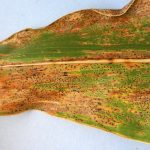
Illinois researchers seek weapons against tar spot in corn
Science Notes: The race is on to find genes that control tar spot resistance

New foliar fungicide controls major crop diseases
Bayer recently announced that Delaro Complete has been registered for use in Eastern Canada on corn, soybeans and cereals. The new foliar fungicide controls major corn, soybean and cereals diseases. […] Read more
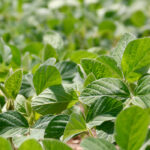
Group 7 seed treatment protects against sudden death syndrome
Soybeans show more above and below ground biomass with the treatment
New fungicide seed treatment Saltro protects soybeans from sudden death syndrome and canola from airborne blackleg, new research indicates. The seed treatment, with the active ingredient Adepidyn, is a Group […] Read more

Fungicides not always an answer in alfalfa
Spraying could make sense when conditions are right for fungal disease
Farmers must weigh many factors before applying fungicides to alfalfa, said Christine O’Reilly, forage and grazing specialist with the Ontario Ministry of Agriculture, Food and Rural Affairs. Why it matters: […] Read more
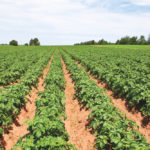
Fungicide reductions challenge potato growers
Spraying programs could double in cost in 2020
Regulatory changes by the Pest Management Regulatory Agency (PMRA) are limiting fungicide options for Ontario potato farmers. That means more cost and more chance of resistance, says Darin Gibson with […] Read more
Syngenta launches five new fungicide products
Syngenta Canada recently launched Miravis, a lineup of five fungicide products designed to protect crops against several of the most destructive diseases facing Canadian farmers. Miravis fungicides are built with […] Read more
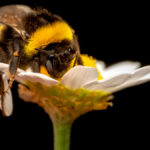
Bees approved to deliver disease control
Ontario technology gets U.S. approval for bio-fungus delivery by bees
Glacier FarmMedia – Thirty years is a long time to wait. For John Sutton, the wait has been worth it because his novel idea from the late 1980s is finally […] Read more
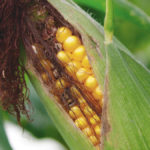
Timing fungicide applications on corn crops essential
Delayed maturity of corn may put it into more favourable conditions for disease development
Delayed maturity in corn throughout the province from late planting into challenging soil conditions is causing corn maturity to move into more favourable conditions for many diseases. Albert Tenunta, OMAFRA’s […] Read more

Fungicide re-evaluation has growers looking for alternatives
PMRA re-evaluation of chlorothalonil will make it more difficult to use
Chlorothalonil, a broad-spectrum multi-site fungicide active ingredient found in horticulture fungicides, has been re-evaluated by the Pest Management Regulatory Agency (PMRA) for all uses within agriculture and turf. It is […] Read more
